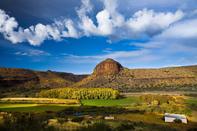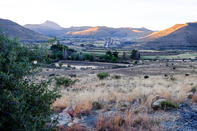Karoo-period Fossils in Nieu Bethesda
When you look at some of the hills, you can clearly make out the concentric strata, each one representing a period in time when the sediments were laid down during what we now call the Lower and Middle Beaufort period of the Karoo geological sequence.

It was a time when this part of the earth was much wetter when most of the land was covered by wetlands around which grew prototype plants and trees in great profusion. It was also a time during which the first land inhabitants, primitive amphibians, evolved through a zoological phantasmagoria of early mammal-like reptiles, the likes of which we can only goggle at now.
You can see the remains of some of these creatures right there in sediments where they died - you can take a tour is the stream-bed to see some of them, if it's not in flood. Others can be seen in spectacular fossil collections on nearby farms such as Wellwood and Ganora, both of which offer accommodation and other earthly pleasures, like Karoo hospitality and food, and guided tours.
Palaeontologists Mecca

What South African town has produced more palaeontologists than any other? This is a trick question, because Nieu-Bethesda is not really a town. But if you include amateurs as well as professionals, then they number at least five, which is not bad for a place that is barely a village. However, Nieu-Bethesda and the surrounding hills are incredibly rich in Karoo-period fossils.
This is even the hometown of South Africa’s own ‘Indiana Jones’; James Kitching helped confirm the theory of continental drift and had a dinosaur named after him when he was only seven. The nearby farm of Wellwood houses the largest private collection of mammal-like reptiles (pre-dinosaur beasties) in the world, dating from around 200 million years ago.
It contains around 100 types of specimens, each named and described. In the village itself is a little museum, the patron of which is Wellwood Farm-born Bruce Rubidge (current head of the Bernard Price Palaeontological Institute), and the museum staff will show you fossils in the riverbed if you ask (and pay a small fee). You can also enjoy fossil tours at Ganora Farm nearby.
By David Bristow